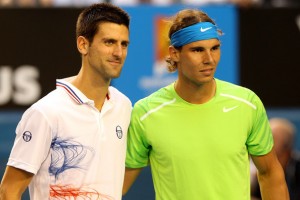by Thomas Swick
Contemporary tennis defies logic. Most people will tell you that something can’t be constantly changing and dull, in the same way that something can’t be predictable and thrilling. But most people didn’t watch the Australian Open.
On Friday night, Victoria Azarenka won her first Grand Slam title with a victory in straight sets over Maria Sharapova. The only thing that kept the match from qualifying as a snoozer was the fact that the high decibel levels of both players’ screams made it impossible for anyone watching to fall asleep.
The win catapulted the Belarusian to No. 1 in the rankings, replacing Caroline Wozniacki, the Grand Slam bridesmaid who lost in straight sets in her quarterfinal match against Kim “Supermom” Clijsters. The quarterfinals gave us the last of the women’s tiebreaks – a feature of tennis that it is no less exciting, and a lot more equitable, than the shootout in soccer.
The women’s game is becoming one of remarkable flux and drama-drained matches. Of last year’s Grand Slam winners – Kim Clijsters, Li Na, Petra Kvitova and Samantha Stosur – only Clijsters and Kvitova made it to the Melbourne semifinals, after which they both departed the scene.
Freshness trumping consistency is not necessarily a bad thing; everybody likes to see new faces. But it’s not good for tennis when fans forget the old ones. It makes their accomplishments look a little suspect. Li Na lost in the fourth round, while Stosur – who came inwith momentum from winning the previous Slam – was knocked out in the first round by Sorana Cirstea.
Yes, Sorana Cirstea.
And, as tended to be the case on the women’s side, the match was over after two sets. The women’s U.S. Open champion failed to win a set – in effect, failed to show up on her home court – when matched against the 59th ranked player in the world.
Two rounds later, 13 of the 16 women’s matches were won in straight sets. As much publicity as the screams got, this women’s tournament was really about the yawns.
 On the men’s side the landscape is drastically different. It’s hard to imagine any of the top four players – Novak Djokovic, Rafael Nadal, Roger Federer or Andy Murray– exiting a Grand Slam in the first round. In fact, with Djokovic it’s getting hardto imagine him exiting without the trophy. But watching his seemingly inexorable progress toward the prize is the antithesis of boring.
On the men’s side the landscape is drastically different. It’s hard to imagine any of the top four players – Novak Djokovic, Rafael Nadal, Roger Federer or Andy Murray– exiting a Grand Slam in the first round. In fact, with Djokovic it’s getting hardto imagine him exiting without the trophy. But watching his seemingly inexorable progress toward the prize is the antithesis of boring.
He played a grueling, five-set semifinal against Murray, while in the other semi, Nadal needed four sets to dispatch Federer. There they were again: the Serb, the Spaniard, the Swiss, and the Scot. Rulingthe men’s game is a hierarchical Gang of Four.
But nobody is complaining, at least not in the stands. The final promised yet another dream matchup of the indefatigable versus the invincible. It would, we knew, go more than three sets, and all of them would last longer than 36 minutes (the time it took Azarenka to bagel Sharapova). All as predicted, and all spectacularly riveting.
If you woke up late on Sunday – and it had to be quite late, since the match sailed on for nearly six hours – you saw that it was being replayed under the heading of “Instant Classic.” Djokovic, after losing the fourth-set tiebreak, looked ready to crumble, netting a few forehands on seemingly spent legs. We were told that he had never won back-to-back five-set matches.
But the Orthodox Tebow crossed himself repeatedly, kissed the wooden cross he wears around his neck, and made impassioned entreaties to the heavens. And, miraculously, Nadal started to flag. He still ran down pretty much every shot, but he also committed some stunning unforced errors. The man who has made a career out of jumping up and down, pumping his fist, sprinting to the baseline, was seen after one point bent over in exhaustion, trying to catch his breath.
But he couldn’t catch Djokovic. Hitting an easy winner on a desperately returned serve, the Serb flopped ecstatically onto his back. After a wet hug on the other side of the net, he ripped off his shirt as he walked toward his box and let out a series of primal screams. The weary supplicant had become the bare-chested King of the World.
During the awards ceremony, both players grimaced and stretched away cramps until staff members kindly brought out two chairs (Djokovic gentlemanly sending the first one to Nadal). Both overcame unimaginable mental and physical exhaustion to give gracious speeches in a language not their own. Both said everything we expected them to say, yet nevertheless we found it uplifting.
